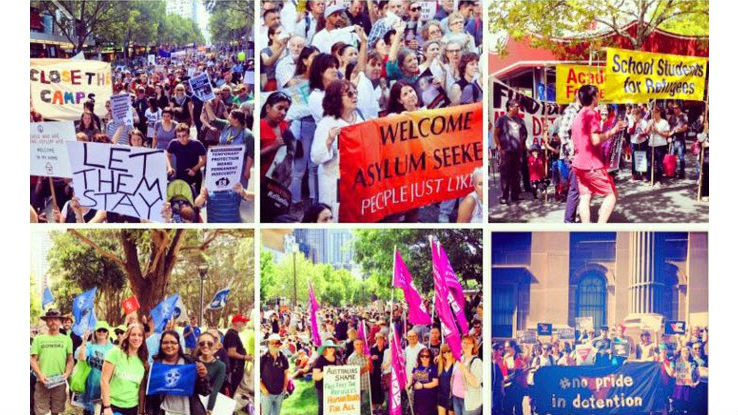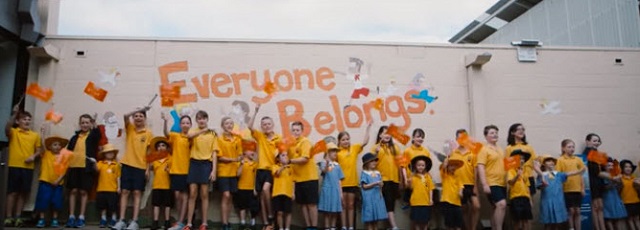Offshore Detention Clouds Australia's Harmony Day

On March 21, Australians are being encouraged to celebrate Australia’s culturally diverse and cohesive society to mark Harmony Day, a day that reinforces the importance of inclusiveness to all Australians, respecting cultural, religious and linguistic diversity, and promoting a tolerant and cohesive society.
Australia’s diversity and spirit of cultural acceptance is its strength, said the Department of Immigration and Border Protection in a statement.
Harmony Day is particularly important to the Department of Immigration and Border Protection given its role in facilitating international trade, visitors and temporary and permanent migrants to Australia.
The Department, including its operational enforcement arm the Australian Border Force, prides itself on being inclusive and accepting. Today, more than 16 percent of its staff come from culturally and linguistically diverse backgrounds and more than 220 staff identify as Indigenous.
The Department is Australia’s trusted global gateway, the statement said. Its efforts concentrate on protecting the border to keep it, and the Australian way of life, safe.
Since October 1945, the Department proudly managed the migration of more than seven million people to Australia. More than 825,000 of these people arrived under the department’s humanitarian program.
However, the Department has come under fire recently and issued a statement on March 8 in response to recent media reporting regarding children and conditions in immigration detention. “Any insinuation the Department denies the atrocities committed in Nazi Germany are both ridiculous and baseless,” said the statement. Media claims had linked state abuses in Nazi Germany to migrant detention in Australia.
Michael Pezzullo, Secretary of the Department of Immigration and Border Protection issued a statement saying:
“Consistent with the law of the land, and under direction of the government of the day, the Department of Immigration and Border Protection operates a policy of keeping children in detention only as a last resort, and releasing those children that might be in detention as soon as reasonably practicable.
“This is a very contentious area of public policy and administration. Sometimes emotions rise and facts gets distorted. For the reputation of my Department and its officers, it is crucial that I set the record straight: the Department and its uniformed operational arm, the Australian Border Force, does not operate beyond the law, nor is it an immoral ‘rogue agency.’
“Recent comparisons of immigration detention centers to gulags; suggestions that detention involves a “public numbing and indifference” similar to that allegedly experienced in Nazi Germany; and persistent suggestions that detention facilities are places of ‘torture’ are highly offensive, unwarranted and plainly wrong – and yet they continue to be made in some quarters.
“In the same vein, any contention that prolonged immigration detention represents ‘reckless indifference and calculated cruelty,’ in order to deter future boat arrivals, do not pass even the most basic fact check. The number of children in detention would not be falling if that were the case.”
Last month, a group of medical and educational experts who spent time with asylum seeker children detained by Australia backed calls for their immediate release. The call followed a report by a medical team led by the Australian Human Rights Commission that found what it describes as alarming evidence about the mental and physical health of children held at the Wickham Point detention facility in Darwin. Many of the children detained there had also spent time in Australia's offshore asylum seeker processing facility on Nauru.

Report author and pediatrician Professor Elizabeth Elliott said of the children over eight years old who had previously been detained on Nauru, 95 percent were assessed as being in the clinical range, or at risk of, post-traumatic stress disorder.
The Human Rights Commission’s report came after the High Court ruled Australia's offshore detention system, which also takes in Papua New Guinea's Manus Island, are lawful.
Refugee advocates fear the decision paves the way for more than 260 asylum seekers, among them over 90 children, currently in Australia to be deported to Nauru where there have been allegations of rape and other mistreatment of children.
The Human Rights Commission says there are currently 174 children in closed immigration detention facilities in Australia and on Nauru.
Opposition to Australia’s offshore detention activities continue, and on Sunday, in every state across Australia, thousands walked for justice for refugees as part of Harmony Day celebrations.
